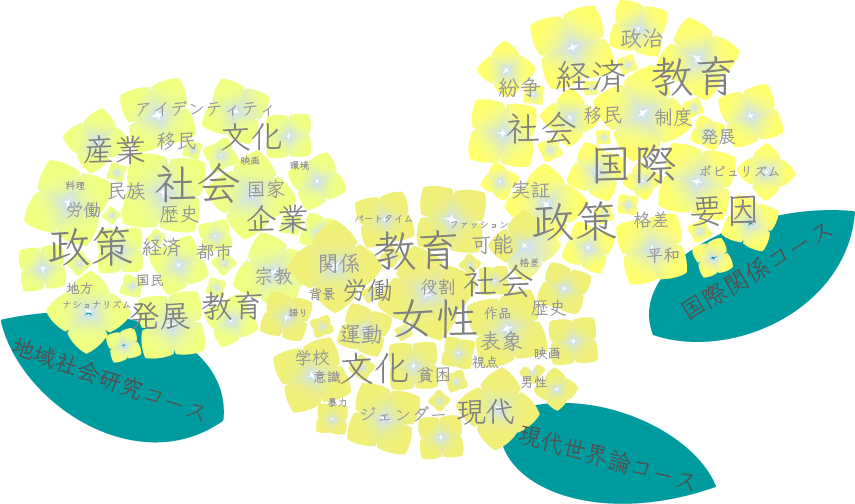Courses
Three Courses to Master “Specialized Fields”
Students choose one from the three courses upon admission to the School of International and Area Studies.
The difference between the three courses becomes critical in the second half of university life for students working to master their “specialized fields.”
While the specialized viewpoints of the three courses are different, they have various overlapping subjects, just like three flowers in the flower bed with petals touching each other.
How will you grow the flower of the seeds of the topics in your hand? Choosing a course at the School of International and Area Studies is a crucial first step in training your eyes to look at the wide open sky of the international community.
Customized Learning
The curriculum of all three courses consists of “introductory” subjects, “survey” subjects, and “specialized” subjects.
In the first half of the courses, during the first and second years, students study the viewpoint of the three courses through the “introductory” subjects. Establish your own learning style with an eye to build a broad-ranging foundation for becoming an international professional.

Comprehending the reality of the area with the five senses
Area Studies Course

As everyone know from firsthand experience, the world is undergoing drastic changes with the advance of globalization. A structural understanding of various areas has become even more important in this unprecedented era. The Area Studies Course is where specialized training is offered for developing an “eye” for looking at each area. What we teach is the reality of the people living there, which is only possible to grasp by feeling the air they breathe.
The world is not homogenous; it is the amalgamation of diverse and complex regional characteristics. The axes of time (history) and space (maps), as well as flexible shift of viewpoint are essential for understanding this complexity. The eyes of the mouse moving around the field, the eyes of the bird looking down from the sky, and the eyes of the common folk actually living his daily life. The Area Studies Course is also where students constantly face the question: how do you interact with society? Let us learn the importance of engaging with the local community, not as a spectator, but as a member of society.
Critical observation and comprehension of the essence of contemporary global issues
Contemporary Global Studies Course

This course aims at comprehending the essence of the complex and diverse issue clusters in the contemporary world through flexible, critical thinking, as well as acquiring the capability to work on them persistently.
- Classes are offered on such subjects as philosophy, political science, history, sociology, anthropology, sociology of education, gender studies, global studies, and racism studies. Ability to examine various world issues is acquired by moving flexibly across these subjects.
- For example, starting from such issues as capitalism and neo-liberalism, violence and non-violence, environmental destruction and climate change, human life and politics, populism and fascism, tourism and nature, social inequality and education, colonialism and Asia, social status and social class, war and gender, race and labor, and Okinawa and mass movement, students come to question the existing norms and values while familiarizing themselves with both the orthodox and the most advanced research with the aim of acquiring critical and imaginative intellectual capability to understand the modern world.
Acquiring intellectual skills to get through in the international community
International Relations Course

-
Acquire a specialized field
TUFS students normally specialize in language(s) and a major area. However, what is your specialized field? Here at the International Relations Course, students use their knowledge of language and geographical area to acquire the knowledge and skills required to understand the international community. This becomes their analytical tool and their specialized intellectual skill. -
Systematic Learning
The curriculum of the International Relations Course is mostly covered by the academic field known as social sciences. All specialized fields consist of knowledge, theories, and analytical methodology accumulated and established in the world over time. This course offers systematic learning for each specialized field as shown in the following diagram. -
Skill for continuous learning
Ideas and skills in the world change constantly. Training in independent thinking, analysis, and communication in the seminars under the International Relations Course equips students with the ability to continue learning even after graduation.

